by lauenc | Oct 7, 2024
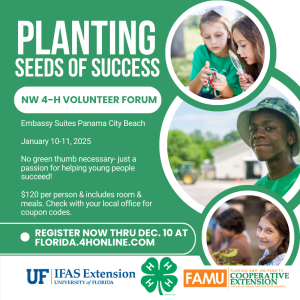 Dates: January 10-11, 2025
Dates: January 10-11, 2025
Location: Panama City Beach, FL
Are you excited about helping young people grow? Do you want to become a stronger leader and connect with others who share your passion? Then save the date for the Northwest 4-H Volunteer Forum in Panama City Beach! We’re looking forward to a weekend filled with learning, fun, and connection. This forum is a great chance for 4-H volunteers to gain new skills, share ideas, and make an even bigger impact on the youth we serve.
Volunteers are the heart of 4-H. You play a vital role in mentoring young people and helping them grow in projects like agriculture, science, health, and citizenship. Without your time and dedication, 4-H wouldn’t be able to fulfill its mission to empower and guide the next generation.
One of the best parts of attending the forum is the chance to network with fellow volunteers. Connecting with others who share your passion for 4-H opens the door to collaboration and learning from each other’s experiences. By building communities of practice, we strengthen our local programs and create lasting partnerships that help us serve youth more effectively. These connections can lead to new ideas, shared resources, and ongoing support from others who understand the challenges and rewards of volunteering.
At the forum, you’ll have the chance to attend workshops designed to strengthen leadership, build new programs, and provide helpful tips for mentoring youth. These sessions will be led by experienced 4-H Agents and volunteers who can’t wait to share their insights. You’ll leave with fresh ideas and skills to take back to your 4-H community, helping to make an even bigger difference.
Register today to be part of this exciting opportunity! Not only will you grow as a leader, but you’ll also contribute to the success of 4-H for years to come. Let’s work together to inspire the next generation of leaders and problem-solvers. Don’t miss out—come grow, connect, and lead with us!
Feel free to share this invitation with other volunteers or anyone interested in supporting 4-H. Let’s grow together!
Register in 4Honline now through December 10th.
by Valerie Mendez Stansly | Aug 23, 2024
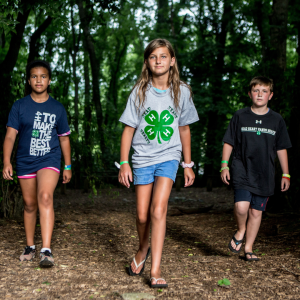 Every fall, as the North Florida Fair rolls into Tallahassee, 4-H members eagerly anticipate 4-H Day, a special day filled with excitement beyond the usual fair food and rides. This annual event offers 4-H participants a chance to dive into a range of contests and activities, with one of the highlights being the Wildlife Ecology contest. During this competition, young people get the opportunity to test their knowledge and skills by identifying various forest trees and wildlife, making it a fantastic blend of fun and learning.
Every fall, as the North Florida Fair rolls into Tallahassee, 4-H members eagerly anticipate 4-H Day, a special day filled with excitement beyond the usual fair food and rides. This annual event offers 4-H participants a chance to dive into a range of contests and activities, with one of the highlights being the Wildlife Ecology contest. During this competition, young people get the opportunity to test their knowledge and skills by identifying various forest trees and wildlife, making it a fantastic blend of fun and learning.
The Contest
The 4-H Wildlife Judging Contest is a showcase of both individual and team talents. All youth ages 8-18 can participate as individual competitors. Participants from the same county can also be organized into teams of 3 or 4, and compete at Junior, Intermediate, and Senior levels based on age. At the end of the contest, the scores from the top three team members are combined to determine the team’s overall performance.
The contest is divided into various stations, each focusing on different aspects of wildlife and forest ecology. Three main topics covered during the fall contest are:
- Trees
- Mammals
- Birds, Reptiles, and Amphibians
Beyond the Contest
The 4-H Wildlife Judging Contest is much more than a competitive event; it’s a platform for essential life skill development. Preparation for and participation in the contest teach youth valuable lessons beyond academic knowledge of Florida’s ecology:
- Critical Thinking: Evaluating plants and wildlife involves using what youth know to make smart decisions. They have to consider various details, like the characteristics of different species and their role in the environment in order to properly identify the plant or animal species. This hands-on approach helps youth develop better problem-solving skills and feel more confident in their decision-making.
- Teamwork and Leadership: The contest encourages students to work together, which helps them learn how to communicate and support each other effectively. They also get a chance to take on leadership roles, guiding their team and making sure younger members understand the subject matter during preparation meetings. These experiences helps youth build important skills for working well with others in school and in their future careers.
- Dedication and Perseverance: Preparing for the contest takes a lot of hard work and commitment, as youth need to study and practice regularly. This process teaches them the value of persistence and dedication, which are important for achieving success in any area of life. The skills they develop through this effort can help them tackle challenges and stay focused on their goals.
Starting a Wildlife Ecology Club
If the opportunities offered by the 4-H Wildlife Judging Contest has inspired you, starting a Wildlife Ecology Club at your school or community center is a great way to engage more youth in environmental education. These clubs are wonderful way of integrating various age groups and skill levels, allowing members to work both independently and collaboratively. Inviting special speakers such as extension agents, foresters, and rangers can introduce youth to meaningful careers in forestry and wildlife conservation. In addition to club meetings, monthly hikes can provide hands-on experience, allowing kids to explore the outdoors while refining their identification skills.
Your local county 4-H agent and staff are the greatest resource on how you could get started in your area. Many counties in Florida already boast 4-H community clubs dedicated to wildlife and forest ecology that you can volunteer or meet to shadow before starting your own club. In addition, the Florida 4-H Forest Ecology page offers a wealth of information regarding the annual statewide and national Forest Ecology Contest that is held each spring.
Conclusion
The 4-H Wildlife Judging Contest at the North Florida Fair exemplifies the intersection of competition and education, offering a dynamic platform for youth to deepen their understanding of Florida’s forests and wildlife. Beyond the competition, the skills and experiences gained through participation are invaluable, preparing young individuals for future challenges and opportunities. Whether through participating or starting a new club, engaging with Florida’s wildlife and ecology fosters a lifelong appreciation for the natural world and equips youth with essential life skills.
by lauenc | Aug 6, 2024
2024 4-H Northwest District Tailgating (Grilling) Contest Results
The 2024 4-H Northwest District Tailgating (Grilling) Contest was a great success and served as a platform to showcase the grilling talents of youth from various counties. This event is part of the broader Florida 4-H Tailgating Contest program, that aims to promote the safe preparation of animal proteins and develop valuable life skills in youth. The 2024 Florida 4-H District and State Contests are sponsored by Publix Super Markets and Sonny’s BBQ.
Program Overview
The Florida 4-H Tailgating Contest encourages participants to grill different types of proteins, including beef, pork, poultry, and shrimp. Youth compete at county and district levels, with top performers advancing to the state competition. The Contest also requires participants to create a tabletop display to show off their recipe and creativity. Participants may use a laptop/iPad/poster & easel to complement their tabletop display to describe their recipe. The overall program emphasizes the development of grilling skills, highlights food and fire safety, and promotes healthy lifestyle choices.
2024 CONTEST RESULTS
Beef Category
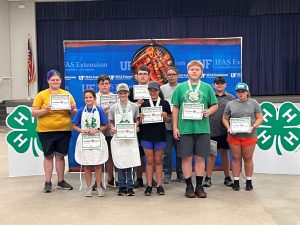
- 1st Place: Cate B. (Okaloosa)
- 2nd Place: Jade L. (Liberty)
- 3rd Place: Sydney G. (Escambia)
- 4th Place: Charlie B. (Gadsden)
Pork Category
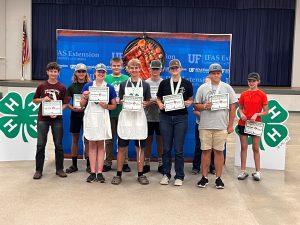
- 1st Place: Taylor A. (Escambia)
- 2nd Place: Josh W. (Washington)
- 3rd Place: Brogan B. (Holmes)
- 4th Place: Malec C. (Liberty)
Chicken Category
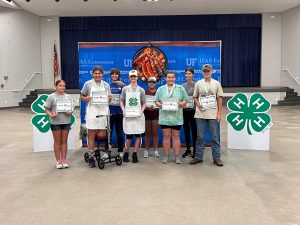
- 1st Place: Tucker P. (Escambia)
- 2nd Place: Braden P. (Escambia)
- 3rd Place: Kylie T. (Bay)
- 4th Place: Emmit A. (Holmes)
Shrimp Category
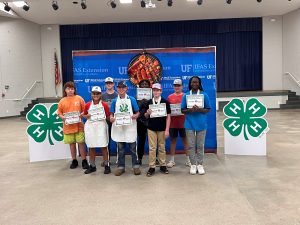
- 1st Place: Chipper M. (Holmes)
- 2nd Place: Jeb W. (Gadsden)
- 3rd Place: Hunter S. (Escambia)
- 4th Place: Cheyanne H. (Gadsden)
Prizes
Winners in each category were awarded as follows:
- 1st Place: $400
- 2nd Place: $250
- 3rd Place: $100
- 4th Place: $50
State Competition
The top two winners from each category will advance to the Florida 4-H Tailgating State Contest on October 5, 2024, at the Animal Sciences Beef Teaching Unit in Gainesville, FL. Participants will have the opportunity to compete for further recognition and scholarships.
State Contest
For each protein category:
- 1st Place: $1,500
- 2nd Place: $1,000
The Florida 4-H Tailgating Contest not only provides a competitive platform but also equips youth with essential life skills, fostering a healthy lifestyle and decision-making abilities (Florida 4-H) (UF IFAS Extension). For more information about the District Contests and the State Contest, contact your local 4-H Agent and visit Tailgate Contest – Florida 4-H – University of Florida, Institute of Food and Agricultural Sciences – UF/IFAS (ufl.edu).
by Rachel Pienta | Jul 5, 2024
Fairs have been part of the 4-H youth development experience since 1902. The origins of what we have come to know as a fair can be historically documented as early as 500 BC. The earliest fairs were community celebrations to recognize religious feast days, celebrations of the harvest, and festive occasions when traveling entertainers visited towns and villages. In some communities, fairs were a source of revenue for churches.
In modern times, fairs have come to be associated with midway rides and creative fair vendor food offerings. However, for 4-H members county, regional, and state fairs are an important part of the 4-H club year. Youth members prepare exhibit entries that may include crafts, photos, baked goods, art, and models. Fairs in the United States have agricultural roots. The first fairs were organized at the county level by local agricultural societies. These fairs included competitions that featured the best livestock specimens. In the United States, the county agricultural fair tradition dates back to 1811. 4-H members may show poultry or livestock. Youth may compete in a skills or knowledge-based competition or skill-a-thon. Today’s fairs showcase agriculture with livestock competitions and exhibits. Modern fairs have added components that help connect the community to other agricultural products and may featured baked goods, canned items, honey, and more.
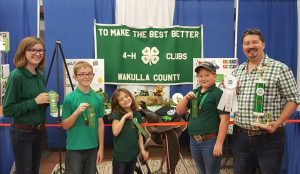
4-H members show off their North Florida Fair ribbons.
4-H Project Learning and the Local Fair
Positive youth development is at the heart of the 4-H experience. Fair participation can serve as a hands-on way to learn and apply life skills beyond the club setting. Youth may be earning blue ribbons while they also learning important life skills and becoming engaged members of their local community.
4-H members can enter projects in the fair in multiple categories. For example, a poultry project can be documented with a tabletop exhibit that illustrates how the project was conducted. The bird may be entered as an exhibit in the agricultural department. Photos of the bird may be entered into the photography category. Youth can design a flyer to sell eggs and enter it into the graphic design category. Other possible fair entries can be products produced as part of the 4-H learn by doing experience in clubs or summer camps. Projects can be documented through photos, graphic designs, or exhibits and all of this work can become one or more fair entries.
Preparing fair entries can be part of the 4-H year and can also serve as ways to document youth learning and, at the same time, recognize achievement. Youth can enter artwork, poetry, crafts, constructed models, collections, and baked goods. Fair exhibit entries may do double duty for county and state events. For example, a photo or graphic design entry may also be used for competition in a county showcase or entered in the state contest.
Preparing to enter an exhibit, compete in a skill-a-thon, or to show a project animal at the fair can provide youth with a time-limited, concrete goal to achieve. For example, in Wakulla 4-H, club leaders kick off the club year in September with an introduction to the North Florida Fair and the ways to participate so that youth can opt to start the membership year with a fair experience. After the North Florida Fair concludes in November, club leaders encourage the youth to set their sights on preparing a presentation or entry for county showcase and state contests.
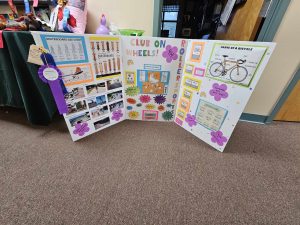
This tabletop exhibit illustrated 4-H club project learning.
Fairs and the 4-H Club Year
From the state fair to county and regional fairs, there is a fair participation opportunity available for every 4-H member. The Florida State Fair is held in Tampa each February. This fair includes agricultural science skill-a-thons, the Florida 4-H Food Challenge, and other agricultural contests.
There are a wide variety of opportunities to attend and participate in a local fair throughout the Florida Panhandle and Big Bend region. Some fairs limit entries to one county or multiple counties while other fairs allow any 4-H member to enter exhibits or competitions. Some fairs may also have a dual FFA component. It is not uncommon for Future Farmers of American (FFA) and 4-H members to be in the same agricultural shows together.
The Washington County Youth Fair spans late February into early March. The Santa Rosa County Fair is held annually in April. The Northwest Florida Fair is held in Fort Walton Beach in September. The Walton County Fair is also held in September in DeFuniak Springs. The Central Panhandle Fair is held annually October in Bay County. The Pensacola Interstate Fair is also held in October in Escambia County. While the North Florida Fair in Tallahassee closes out the fair calendar year in November, the 4-H club year has only just started!
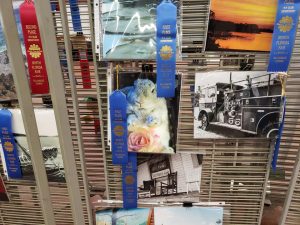
North Florida Fair 4-H photo entries.
For more information about 4-H and how to become involved with clubs, camps, and fairs, find your local Extension office in any Florida county.
The Institute of Food and Agricultural Sciences (IFAS) is an Equal Opportunity Institution authorized to provide research, educational information, and other services only to individuals and institutions that function with non-discrimination with respect to race, creed, color, religion, age, disability, sex, sexual orientation, marital status, national origin, political opinions, or affiliations. U.S. Department of Agriculture, Cooperative Extension Service, University of Florida, IFAS, Florida A&M University Cooperative Extension Program, and Boards of County Commissioners Cooperating.
Resources
4-H and the County Fair
Agricultural Tradition
Fairs Provide Life Skills for 4-H Youth
History of Fairs
List of Select Florida Fairs
Motivation for and Developmental Benefits of Youth Participation in County 4-H Fairs: A Pilot Study
Why Are Fairs So Important to 4-H?
by lauenc | Feb 5, 2024
Hunting, when approached responsibly, can be a rewarding and educational experience for young individuals. As a 4-H agent dedicated to fostering a love for the outdoors, I recognize the importance of instilling a strong foundation of ethics and safety when introducing youth to the world of hunting. To ensure a positive and educational introduction to this amazing tradition, several key considerations should be considered.
- Safety Training and Ethical Hunting Practices:
The Florida Fish and Wildlife Conservation Commission (FWC) offers comprehensive safety resources, emphasizing the importance of proper firearm handling, wildlife identification, and safe hunting practices. Educating young hunters about the critical role of safety protocols ensures a secure and enjoyable experience in the field. There are a variety of hunter safety courses available. Visit the Which Hunter Safety Course Is Right For You? | FWC (myfwc.com) webpage to find out what course to see what may work best for your family. If you have completed an online course and have a certificate, you can participate in the upcoming Field Day on November 18, 2023 at West Pittman Baptist Church in Holmes County. Visit the Hunter Safety Registration (site.com) webpage to register or find other courses in your area on a different date.
- First Shot Fundamentals:
Holmes County 4-H has been awarded several grants from the The National Rifle Association (NRA) Foundation. Our Holmes County 4-H Shooting Sports Program includes archery, rifle, and shotgun disciplines. Youth members learn “first shot fundamentals” that will translate to important life skills as they may choose to ultimately participate in hunting opportunities. Emphasizing the values of fair chase, respect for wildlife, and the importance of humane and responsible harvesting helps instill a deep appreciation for the natural world and ecosystem.
- Conservation Education:
Collaborating with 4-H programs that incorporate conservation education can help young hunters understand the vital role they play in wildlife conservation and habitat preservation. Teaching the principles of sustainable hunting and the importance of maintaining ecological balance contributes to the development of environmentally conscious and responsible hunters. This also includes ongoing education and research related to Chronic Wasting Disease (CWD) in Holmes County and the surrounding region to learn what we, as hunters, can do to help.
- Mentorship Programs:
The Florida Fish & Wildlife Conservation Commission often organizes mentorship programs that pair experienced hunters with newcomers. These programs, align with 4-H’s emphasis on positive youth development and foster a supportive learning environment. Mentors follow the guidance outlined in mentorship materials to provide hands-on training, impart valuable skills, and promote the development of strong ethical values in young hunters. Visit the Mentored Hunts Registration (site.com) webpage to find upcoming opportunities across the state of Florida.
- Legal Compliance and Regulations:
The Florida Fish and Wildlife Conservation Commission (FWC) provides up-to-date information on hunting regulations, licensing requirements, and seasonal restrictions. Educating youth about these regulations instills a sense of responsibility and legal compliance, contributing to the cultivation of law-abiding and conscientious hunters.
By integrating these considerations into the process of introducing youth to hunting, we can ensure that they develop not only a passion for the sport, but also a respect for wildlife and the natural world. Together, we can foster the next generation of responsible and ethical hunters who prioritize safety, conservation, and ethical hunting practices in their outdoor adventures. For more information about how your youth can get involved with Holmes County 4-H, visit the Holmes County 4-H (holmescounty4h.com) webpage.
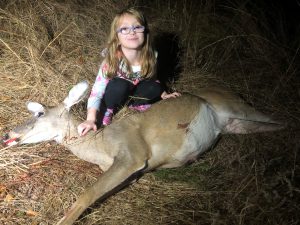
Miah, daughter of the Holmes 4-H Agent, enjoys the opportunity to harvest her first deer at age 6.
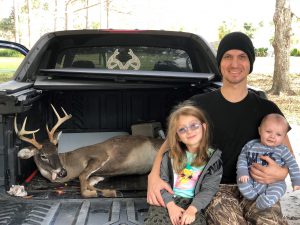
Holmes County 4-H Agent, Chris Lauen, introduces his children to a Holmes County whitetail buck.
 Dates: January 10-11, 2025
Dates: January 10-11, 2025









